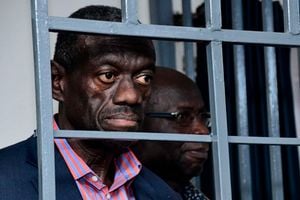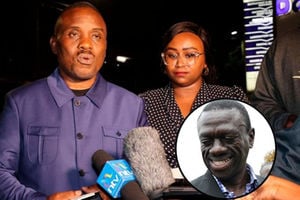
President Yoweri Museveni of Uganda during the inauguration of President William Ruto in Nairobi on September 13, 2022. Inset: Ugandan opposition politician Kizza Besigye.
For years, a weathered red box stored at Nyeri Primary School was the silent custodian of a harrowing tale: The Museveni family’s midnight dash to safety from the lurking shadows of abduction in November 1983.
The box, belonging to Museveni’s daughter, Natasha, had been abandoned as her mother, Janet Museveni, scrambled to shield her family from a web of danger spun by Ugandan and Kenyan operatives. At the time, her husband, Yoweri Museveni, was a guerrilla leader waging war against Milton Obote's regime.
The previous night, some 41 years ago, dread had knocked on Janet Museveni’s Nairobi hideout. The kidnappers, finding only the housekeeper, John, had dragged him into the dark and vanished with him to Kampala. A shaken neighbour warned Janet: “Those people were looking for you.”
Her survival that night, she would later admit in her memoir, My Life’s Journey, felt like sheer providence. “That night I could hardly sleep. I was so anxious about the fate of John and the thought that if I had answered the door [bell], I did not know where I would be.”
Also kidnapped that night, as Janet came to learn was Barak Kirya, the leader of Uganda Freedom Movement. Janet recalled that by morning, “he had already been handed over to the Ugandan government across the border at Busia.”
Today, the tables have turned. Janet Museveni resides in Uganda's State House as the First Lady, while Yoweri Museveni has maintained his grip on power since January 1986. Ironically, they now face accusations of terrorising political opponents and employing mercenaries to abduct dissenters — tactics reminiscent of those Milton Obote allegedly used against them in 1983.
This week’s abduction of Uganda's opposition leader, Kizza Besigye, and his subsequent transport to the Makindye Military Barracks, where he was presented before a military court martial, echoes the dark memories of the pursuit of Ugandan dissidents in Nairobi. Besigye faces accusations of possessing a pistol in Nairobi and allegedly plotting to acquire weapons.
For Museveni, the pistol has long symbolised resistance. In his book Sowing the Mustard Seed, he recounts how he launched the guerrilla movement with nothing more than a single pistol.
During his meetings with contacts in Nairobi, that very pistol was always concealed beneath his jacket. When Winnie Byanyima, Executive Director of UNAids – and a former Museveni bush-ally – announced the abduction of her husband, Dr Besigye, it spotlighted Kenya's growing notoriety as a “kidnapper’s paradise”.
Besigye’s plight follows a string of high-profile abductions, including the forced deportation of four Turkish refugees to Ankara, where they faced allegations of conspiring against President Recep Tayyip Erdogan.
Besigye's ordeal ended with his transfer to the military barracks at Makindye, where he now faces a court martial despite his civilian status. The charges leveled against him: Illegal possession of a pistol and alleged negotiations to acquire arms abroad.
Nairobi has haunting memories for Museveni. It was the place where the threads of his resistance movement against Obote were woven. Even as the Kenyan intelligence watched, Museveni orchestrated a clandestine network of allies, many of them former students.
He had already brought his family to Nairobi, believing that they could find refuge. But the illusion of safety shattered when Obote, with the complicity of President Daniel arap Moi, set a sinister plan in motion to round up political dissidents.
“You are number one on that list,” Janet had been told. Museveni would sneak to Nairobi from Tanzania and outmanoeuvre the conspirators. Within his network, as he later revealed, he developed a coded language to stay ahead of the kidnappers.
“If I said Jinja, it meant Nairobi. If I said Kampala, it meant Kisumu.”
Whether President Museveni’s actions stem from paranoia or not remains unclear. However, it seems he is now employing the very tactics that were once used to intimidate him — this time against his political opponents.
Reflecting on a past encounter in Kenya, Museveni recounted his close call with notorious police reservist Patrick Shaw. It was at the Hilton Hotel that Museveni found himself face to face with Shaw.
“While sitting in the café at Hilton Hotel, having coffee with my nephew, Kiyombo Christopher, I noticed this bulky amateur looking at me over a newspaper he was pretending to read,” Museveni recalled.
“He was seated at a table about 10 metres from ours. I asked Kiyombo who that person was. He whispered to me that it was Patrick Shaw, who had been involved in some notorious incidents in Kenya.”
Sensing danger, Museveni decided to act swiftly.
“I told Kiyombo to remain where we were seated. With my newspaper remaining open, as if I was excusing myself for a short call, I walked through the back of Hilton to the taxis and hired a special one for Namanga.”
At the Namanga border, Museveni — known by the alias Mzee Kassim — was a familiar face. Officials waved him through without a second glance — and he bribed them with cash. “I would go through with anything, including my pistol,” he later revealed.
Fast forward to Kilimani, Nairobi.
Uganda’s political firebrand, Kizza Besigye, had arrived with no pomp as the guest speaker at the launch of Martha Karua’s much-awaited memoir, Against the Tide. It appears that Dr Besigye’s appearance had already electrified the Nairobi and Kampala abduction crews. Of late, Nairobi has turned to be kidnappers’ paradise – according to Law Society of Kenya which has voiced concern about the number of unexplained abduction of locals and foreigners.
On Saturday, at 4pm, Dr Besigye and his political associate Haji Lutale discreetly left their hotel in Kilimani and hailed a taxi. Their destination: 108 Riverside Apartments. Unbeknownst to them, they were either being followed or their phones had been compromised.
According to a statement by Martha Karua, the taxi dropped them off at their destination sometime between 4.30pm and 5pm. The driver watched as his passengers entered the building — unaware that this would be the last time they were seen publicly in Nairobi. The absence of any reported commotion suggests the abduction was executed with military precision.
Dr Besigye was once among Museveni’s most trusted confidants, serving as his personal physician during the bush war. Besigye played a crucial role, tending to wounded soldiers and safeguarding the brigade's health. On one occasion, he even saved Museveni’s life after exhaustion took its toll.
“Besigye, who was a few yards behind me, rushed over and gave me rehydration salts mixed in water,” Museveni recalled in his autobiography, Sowing the Mustard Seed.
“He explained that excessive sweating can lead to fainting. After resting for about 30 minutes, we continued our march...”
Besigye also grew close to fellow rebel fighter Winnie Byanyima, a young Ugandan aeronautical engineer and a trusted confidant of Museveni. However, their camaraderie did not survive the transition from battlefield to statehouse. Some people claim it was personal, than political.
By 2001, Besigye had launched a presidential campaign to challenge his former ally, seeking to unseat Museveni. The move made him an immediate target. Besigye was imprisoned, placed under house arrest, and faced an onslaught of criminal and civil charges — many of them dubious.
By advocating for multiparty democracy and fair elections, Besigye threatened Museveni's grip on power. More dangerously, he organised political activity outside the National Resistance Movement (NRM), a system where Museveni operated as the proverbial spider at the center of the web. For this defiance, Besigye became a marked man.
On Saturday, Besigye left his box in Kilimani, Nairobi, thanks to his abductors. He was not given time to get it. It is the irony of Uganda politics. In 1983, Janet Museveni left her daughter Natasha’s box in Nyeri as she fled kidnappers.
“In order not to raise any suspicion, I told the principal that I was just taking her home for the weekend and she would be back the following week,” she later wrote.
Recalling that incident, in his book, Sowing the Mustard Seed, Yoweri Museveni wrote: “In 1983, (my family) had to leave in a hurry because the government in Uganda wanted to kidnap my wife and children to punish Museveni and because they were ‘security threats to the Government of Uganda!’ What useless outfits these African governments are that are threatened by a housewife and young children.”
Today, it is Museveni conducting high-profile abductions of his opponents.










